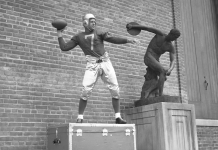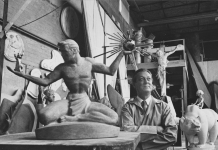1974
A half-century ago on Jan. 2, former state Sen. Coleman A. Young was administered the oath of office as Detroit’s first Black mayor by Michigan Supreme Court Justice John B. Swainson (left) and U.S. District Judge Damon J. Keith (far right) before a crowd of 2,000 people at Ford Auditorium and a live television audience.
Later that evening, Young attended an inaugural concert featuring the and Motown recording star and Detroit native Diana Ross.
Running on a promise to reform and fully integrate the Detroit police force, fight crime, and foster economic development, Young narrowly defeated Detroit Police Commissioner John F. Nichols in a hotly contested race while giving the growing Black community hope, power, and pride.
In his inaugural address, Young, a former Tuskegee airman, autoworker, and union activist, stated in part: “This city has too long been polarized. We can no longer afford the luxury of hatred and racial division. What is good for the Black people of this city is good for the white people of this city. … I don’t give a damn whether [criminals] wear super-fly suits or blue uniforms with silver badges — hit the road!”
Although he was especially hailed as a great leader in the local Black community and would serve five mayoral terms over a 20-year period, Young was sometimes seen as a polarizing figure by many in the largely white suburbs.
Yet despite economic downturns and significant population loss, the dynamic trailblazer known for his colorful language, sense of humor, and political savvy helped shape the city with projects that included, among others, the Renaissance Center, Hart Plaza, the Millender Center, Joe Louis Arena, Stroh River Place, One Detroit Center (now the Ally Detroit Center), the General Motors Co. Poletown plant, and the Chrysler Jefferson North assembly plant.
Upon Young’s death in November 1997 at age 79 due to complications from emphysema, a lung disease, ex-Gov. William G. Milliken (1969-83), a Traverse City Republican who long before had established a friendly bipartisan relationship with Young, stated: “He assumed office when Detroit was in a state of despair and gave hope to thousands of Detroiters that their voices would be heard. He was good for the people of Detroit and Michigan.”
This story is from the January 2024 issue of ∫⁄¡œÕ¯ Detroit magazine. Read more in our digital edition. Plus, find even more The Way It Was articles at hourdetroit.com.Ã˝
|
| Ã˝ |
|








